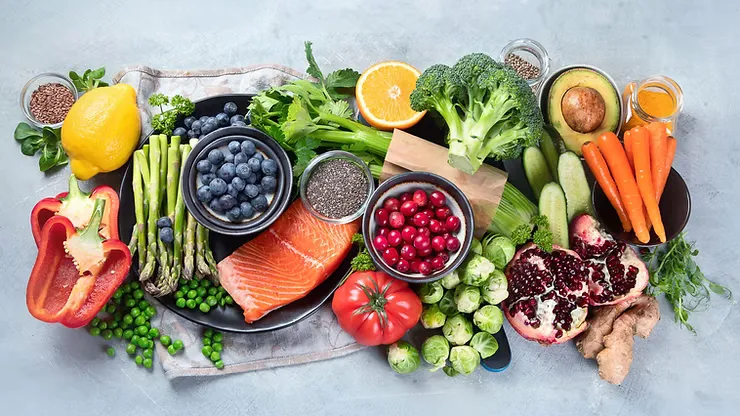
Anti-Inflammatory Foods to Support Hormone Balance

If you’ve been feeling puffy, bloated, and exhausted—despite eating healthy and staying active—you’re not imagining things.
Hormonal shifts in midlife can increase inflammation, making it harder to lose weight, get quality sleep, and cause you to "just not feel like yourself."
How the Right Foods Can Reduce Inflammation & Balance Hormones
Our bodies are constantly working to keep inflammation in check. But when midlife hormonal shifts, stress, and processed foods throw things off balance, inflammation lingers—leading to bloating, brain fog, joint pain, and stubborn weight gain.
The good news? The right foods can help calm inflammation, reset your metabolism, and bring your hormones back into balance.
By focusing on anti-inflammatory, nutrient-dense foods, we can:
✔ Support cortisol balance to reduce belly fat storage
✔ Stabilize blood sugar and curb cravings naturally
✔ Promote estrogen detox to ease bloating and mood swings
Let’s dive into the most powerful anti-inflammatory foods for midlife women.
The Best Anti-Inflammatory Foods for Women Over 50
✅ Fatty Fish (Salmon, Sardines, Mackerel)
Fatty fish are loaded with omega-3 fatty acids, which have been shown to reduce inflammation, support brain health, and promote heart health. Studies suggest that omega-3s can help lower cortisol and insulin resistance, both of which impact midlife weight gain.
How to eat it: Aim for two to three servings per week or consider a high-quality omega-3 supplement.
✅ Cruciferous Vegetables (Broccoli, Brussels Sprouts, Cauliflower, Cabbage)
These vegetables contain sulforaphane, a compound that supports estrogen metabolism and reduces inflammation. Research shows that sulforaphane helps the liver clear excess estrogen, which is essential for balancing hormones in midlife.
How to eat it: Roast with extra virgin olive oil, toss into a stir-fry, or mix into soups.
✅ Avocados
Avocados are packed with monounsaturated fats, fiber, and antioxidants, all of which support blood sugar regulation, brain function, and joint health. Magnesium in avocados also plays a key role in cortisol balance and stress management.
How to eat it: Add to salads, spread on hard boiled egg toast or add into a protein + grain bowl.
✅ Berries (Blueberries, Raspberries, Blackberries, Strawberries)
Berries are rich in polyphenols and fiber, which help stabilize blood sugar, combat oxidative stress, and support gut health. The antioxidants in berries have been linked to reduced inflammation and improved cognitive function in midlife women.
How to eat it: Enjoy as a snack with a serving of raw, unsalted nuts; mix into a serving of yogurt or into a cup of cottage cheese.
✅ Extra Virgin Olive Oil
One of the most powerful anti-inflammatory fats, olive oil is loaded with polyphenols, which protect cells from oxidative damage and support heart health and hormone balance. Research suggests it may help lower inflammatory markers linked to weight gain.
How to eat it: Drizzle on salads, use for roasting veggies, or stir fry dishes.
✅ Chia & Flaxseeds
Both chia and flaxseeds are high in fiber and omega-3s, which support gut health and help clear excess estrogen. Fiber binds to estrogen in the gut, aiding in detoxification and reducing bloating.
How to eat it: Sprinkle onto oatmeal, mix into yogurt or make a chia pudding.
✅ Dark Leafy Greens (Spinach, Kale, Swiss Chard, Arugula)
Leafy greens are rich in magnesium, which helps regulate cortisol, blood sugar, and sleep quality. They also support detoxification pathways, reducing inflammation and bloating.
How to eat it: Add to salads, into an omelet or sauté with garlic and extra virgin olive oil.
✅ Turmeric & Ginger
Turmeric contains curcumin, one of the most well-researched anti-inflammatory compounds. Studies suggest curcumin can reduce joint pain, brain fog, and metabolic inflammation. Ginger also supports digestion and cortisol regulation, helping to lower stress-related inflammation.
How to eat it: Add turmeric to soups, golden milk, or take a curcumin supplement. Use fresh ginger in tea or stir-fries.
How to Start Reducing Inflammation Today
You don’t need a complete diet overhaul—small, consistent changes make a big difference.
✔ Swap processed oils → Use extra virgin olive oil or avocado oil instead.
✔ Prioritize fiber and gut health → Eat cruciferous veggies, chia seeds, and fermented foods.
✔ Balance blood sugar naturally → Pair protein, fiber, and healthy fats at every meal.
✔ Support stress and sleep → Deep breathing, gentle strength training, and magnesium can help.
The Bottom Line
What we eat directly impacts how we feel. By incorporating more anti-inflammatory, hormone-supportive foods, you can:
Reduce bloating and stubborn belly fat
Support metabolism and blood sugar balance
Improve energy and mental clarity
Protect joints and brain health
Your body isn’t broken—it just might be inflamed. And the solution isn’t another restrictive diet—it’s balance.
Next Up: How to Clear Excess Estrogen Naturally
This week’s reel: "Fiber & Detox: How to Clear Excess Estrogen Naturally"
I’ll break down how fiber helps detox excess estrogen and how to use food to support natural detoxification, so stay tuned and....
✨ Let’s turn chaos into harmony and thrive together! ✨